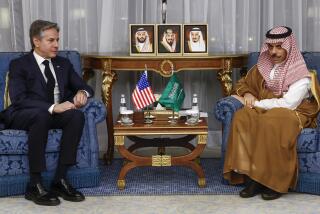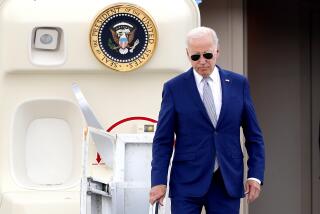Clinton to Visit Pakistan as Part of South Asia Trip
WASHINGTON — After weeks of hand-wringing, the White House announced Tuesday that President Clinton will stop in Pakistan for talks with the country’s military leadership during a five-day visit to South Asia later this month that will also take him to India, Pakistan’s archrival.
The decision to add Pakistan to the itinerary ends a prolonged debate within the administration and is bound to alter the flavor and substance of what promises to be one of the more unusual, and potentially more important, overseas trips of the Clinton presidency.
White House officials told reporters that Clinton will spend several hours in Islamabad on March 25, the final day of a trip that includes a stop in Bangladesh. By visiting the Pakistani capital, Clinton will place himself squarely in the center of a tense political standoff between India and Pakistan, two nuclear states that have already fought three major wars over the past half a century and still engage in frequent military clashes.
In addition, critics say the visit will constitute a de facto blessing of Pakistan’s military rulers, who came to power in a coup in October.
Relations between Pakistan and India are severely strained, and the run-up to Clinton’s South Asian visit coincides with fierce fighting along the two countries’ disputed border in the Himalayan region of Kashmir. More than 60 people--Pakistanis and Indians, soldiers and civilians--have died in cross-border attacks since mid-January.
The Kashmir crisis grew more ominous in May 1998, when India and Pakistan each conducted underground nuclear tests. The fear among U.S. policymakers is that the border fighting could escalate into a nuclear exchange.
Clinton’s visit to Islamabad also takes him to one of the few nations that has at least token influence over neighboring Afghanistan, where accused terrorist leader Osama bin Laden resides. Pakistan’s military ruler, army Gen. Pervez Musharraf, is scheduled to meet with Afghanistan’s radical Islamic Taliban regime soon, and the fate of Bin Laden is said to be a key agenda item.
Clinton is expected to urge India and Pakistan to sign the Comprehensive Nuclear Test Ban Treaty, and to press Pakistan’s military leaders to set a firm date for restoring democratic rule.
The decision to tackle such a volatile agenda in part reflects a president striving for accomplishments during his final months in office. But it also is the mark of a chief executive who seems supremely confident of his powers of persuasion, one convinced that personal rapport between leaders can be an important ingredient in resolving the issues that divide nations.
Although Clinton would have little time left in office to capitalize on any progress the Islamabad meeting might produce, issues such as fighting terrorism and nuclear proliferation are matters that would probably be taken up by any incoming administration.
Clinton will be the first U.S. leader in more than 30 years to visit Pakistan. He follows President Nixon, who went there in 1969 shortly before Islamabad became a crucial conduit in America’s first overtures to Communist China.
“The decision to go to Pakistan [was taken] because the president believes this is in the U.S. national interests for the long run, and not to have gone there would possibly have set [those interests] back,” a senior White House official said.
India reacted coolly to the news that Clinton will visit the capital of a nation it considers an archrival, but it stopped short of criticizing the move. The White House announcement came during the predawn hours on the subcontinent, but an official at the Indian Embassy in Washington said the decision to add Pakistan to Clinton’s itinerary was “clearly the president’s choice.”
“It’s not for India to react,” the official said. “We’re welcoming him to our country, and that’s the main thing.”
Presidential aides stressed that Clinton had telephoned Indian Prime Minister Atal Behari Vajpayee about the added stop and that India remained the prime destination.
“This trip is primarily a trip about India,” one official said. “We will be spending five days in India. We will be visiting five cities in India. When the president and prime minister spoke today, they spoke mostly about the upcoming events in India and how important it is to turn a new page in U.S.-India relations.”
The administration sees India as a potentially important Third World ally as the world begins to build a global trading system.
*
Marshall reported from Washington and Filkins from New Delhi.
More to Read
Sign up for Essential California
The most important California stories and recommendations in your inbox every morning.
You may occasionally receive promotional content from the Los Angeles Times.










